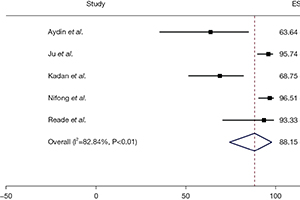Atrial fibrillation ablation during robotic mitral valve surgery: a systematic review and meta-analysis
Abstract
Background: Atrial fibrillation (AF) is the most common arrhythmia, and is also associated with mitral valve disease. Although the benefits of robotic mitral valve surgery are well documented, literature combining robotic mitral valve surgery with AF surgery remains sparse. The aim of this systematic review and meta-analysis is to evaluate the evidence assessing the efficacy and safety of AF ablation during robotic mitral valve surgery
Methods: Five electronic databases were searched from inception to April 2023. All studies reporting the primary outcome, freedom from AF, for patients with a history of AF undergoing robotic mitral valve surgery and AF ablation were identified. Studies which included mixed cohorts, or patients who did not undergo robotic mitral valve surgery were excluded. Relevant data were extracted and a meta-analysis of proportions was conducted using a random-effects model.
Results: Five studies were included with a total of 241 patients. Cohort sizes ranged from 11 to 94 patients. The aggregate mean age was 58.5 years and patients had persistent AF (71.1%). All five studies utilised the da Vinci® Surgical System, and performed variable lesion sets. The freedom from AF was 88.1% at a weighted mean follow-up of 6.9 months. There were two mortalities (0.8%), two patients required conversion to sternotomy (1.4%) and eight required a permanent pacemaker (3.7%).
Conclusions: AF ablation with robotic mitral valve surgery can be performed with adequate short-term efficacy and safety profile. Current evidence on AF ablation and robotic mitral valve surgery is limited to low-quality retrospective data with inherent selection bias. Further large-scale prospective data is required to verify these results.
Cover






